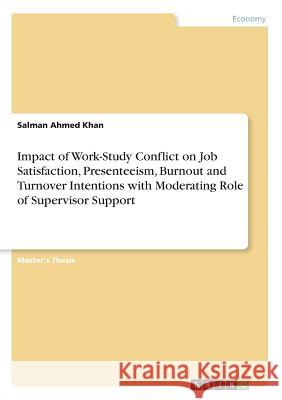Impact of Work-Study Conflict on Job Satisfaction, Presenteeism, Burnout and Turnover Intentions with Moderating Role of Supervisor Support » książka
Impact of Work-Study Conflict on Job Satisfaction, Presenteeism, Burnout and Turnover Intentions with Moderating Role of Supervisor Support
ISBN-13: 9783656986058 / Angielski / Miękka / 2016 / 92 str.
Impact of Work-Study Conflict on Job Satisfaction, Presenteeism, Burnout and Turnover Intentions with Moderating Role of Supervisor Support
ISBN-13: 9783656986058 / Angielski / Miękka / 2016 / 92 str.
(netto: 240,40 VAT: 5%)
Najniższa cena z 30 dni: 250,34
ok. 16-18 dni roboczych.
Darmowa dostawa!
Master's Thesis from the year 2016 in the subject Business economics - Business Management, Corporate Governance, Riphah International University Islamabad (Riphah School of Leadership), course: MS (Management Sciences), language: English, abstract: In order to meet the overpowering job requirements and meeting career related opportunities a large chunk of employees of different organizations be likely to enroll in higher education degree programs. On contrary, in order to meet the educational expenses and unforeseen nature of employment conditions a large number of students seek paid work. Fulfillment of this dual role demand has created tension between both roles i.e. student and employee which ultimately causes work-study conflict. This study examines the impact of work-study conflict on Job Satisfaction, Presenteeism, Burnout and Turnover Intentions with Moderating Role of Supervisor Support among the employees who are working in different organizations and studying in universities. The sample consists of 350 working students of universities employed in different organizations of Pakistan out of which 281 questionnaires were received in a correct form making the response rate of 80.2%. The results of this study depicted that work-study conflict has significant negative relationship with supervisor support and significant positive relationship with presenteeism, burnout and turnover intentions whereas insignificant relationship with job satisfaction. Supervisor support has significant positive relationship with the job satisfaction and has significant negative relationship with the presenteeism, burnout and turnover intentions. Results also show that there is moderation of supervisor support between the relationship of work-study conflict (WSC) and presenteeism and also between the relationship of WSC and burnout. But there is no moderation between the relationship of work-study conflict (WSC), job satisfaction and turnover intentions. Implications and future d











